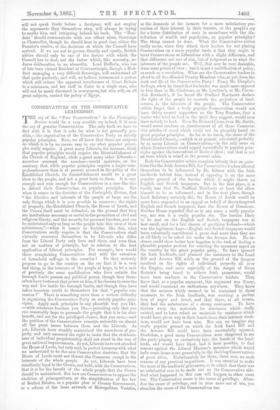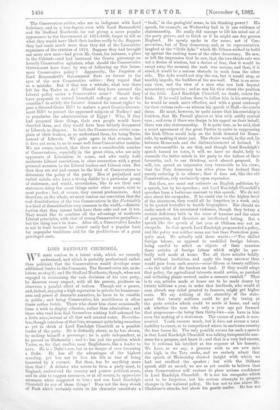CONSERVATIVES ON THE CONSERVATIVE LEADERSHIP.
MITE cry of the "Two Conservatives" in the Fortnightly 1 Review would be a very sensible cry indeed, if it were the cry of genuine Conservatives. The only fault we have to find with it is, that it asks for what is not generally pos- sible,—the organisation of the Conservative Party on strictly popular principles. Now, we all know that there are subjects on which it is by no means easy to Fay what popular princi- ples really require. A great many Liberals, for instance, think that popular principles would require the Disestahlishment of the Church of England, while a greet many other Liberals— ourselves amongst the number—would maintain, on the contrary, that while popular principles require a larger com- prehensiveness than is at present avowed in the policy of the Established Church, its disestablishment would be a great blow to the people, and not a great boon to them. It is easy enough and wise enough for Conservatives in a case like this to defend their Conservatism on popular principles. But when it comes to the doctrine of the Fortnightly Review, that "the liberties and interests of the people at large are the only things which it is now possible to conserve ; the rights of property, the Established Church, the House of Lords, and the Crown itself must be defended, on the ground that they are institutions necessary or useful to the promotion of civil and religious liberty, and the security for personal freedom, and can be maintained only so long as the people take this view of their subsistence,"—when it comes to doctrine like this, what Conservatives really require is that the Conservatives shall virtually announce themselves to be Liberals who differ from the Liberal Party only here and there, and even then not on matters of principle, but in relation to the best application of Liberal principles. For example, how would these complaining Conservatives deal with the extension of household suffrage to the counties ? Do they seriously propose to go to the country on the cry that it is a very bad thing, in the interests of the people at large, to let a man of precisely the same qualification who lives outside the borough limits possess any political power, though they them- selves have bestowed that power on him, if he chooses to cross the way and live inside the borough limits, and though they have taken immense credit to themselves for that " popular con- cession ?" There is something more than a serious difficulty in organising the Conservative Party on strictly popular prin- ciples. Apply such principles in any plausible way you like, —with whatever freedom you like,—providing only that you can reasonably hope to persuade the people that it is for their benefit,. and not for the privileged classes, that you care,—and the position of the Conservatives remaips untenable on almost all the great issues between them and the Liberals. As yet, Liberals have steadily maintained the sacredness of pro- perty, and only assumed the right to insist that the stubborn- ness of individual proprietorship shall not stand in the way of great national improvements. As yet, Liberals have not attacked the House of Lords, but only said, in perfect harmony with what we understand to be the new Conservative doctrine, that the House of Lords must not thwart the Commons except in the interests of the whole people. As yet, Liberals have been steadfastly loyal to the Crown, and hold, with the Conservatives, that it is for the benefit of the whole people that the Crown should be maintained, But how are Conservatives to oppose the abolition of primogeniture, or the simplification of the law of Settled Estates, or a popular plan of County Government, or a reform of the loose network of Metropolitan Vestries, or the demands of the farmers for a more satisfactory pro- tection of their interest in their tenures, or the people's cry for a fairer distribution of seats in accordance with the dis- tribution of wealth and population, on popular principles The thing cannot be done. What the Conservative critics really 'mean, when they attack their leaders for not placing Conservatism on a more popular basis, is that they ought to treat Conservatism as Liberalism with a slight difference, and that difference not one of aim, but of judgment as to what the interests of the people are. Well, that may be very desirable, from some points of view ; but it is not a modification of policy, so much as a revolution. What are the Conservative leaders to plead to all the offended County Members who, as yet, form the rank and file of the Conservative Party ? Fancy Mr. Chaplin's feelings, when he found that his leader was much more opposed to him than to Mr. Gladstone, or Mr. Lowther's, or Mr. Caven- dish Bentinck's, if he heard Sir Stafford Northcote declare the right of the people to. overrule the prejudices of land- owners in the interests of 'the people. The Conservative critics forget that a truly popular Conservatism would not have thirty earnest supporters on the Tory Benches, that a leader who tried to lead in the spirit they suggest, would soon have nobody to lead. Even Sir Richard Cross, even Mr. Smith, would never condone an abandonment of all those Conserva- tive articles of creed which could not be plausibly based on great popular principles. As far as we know, the cause of the Established Church,—which is at present advocated probably by AS many Liberals as Conservatives,—is the only issue on which Conservatives could appeal successfully to popular prin- ciples against the innovations of Relies/ ideas ; and that is not an issue which is raised at the present crisis, Both the Conservative critics complain bitterly that on ques- tions like the Irish Arrears Bill, the Conservative leaders allowed themselves to be influenced by Mr. Gibson with the Irish landlords behind him, instead of opposing it on the more popular ground of the burden which it might throw on English and Scotch taxpayers. But in the first place, it is hardly true that Sir Stafford Northcote at least did allow himself to be so influenced ; and in the next place, though Lord Salisbury certainly did, the House of Lords would no more have responded to an appeal on behalf of the endangered English and Scotch taxpayers, than the House of Commons. Neither House regarded that as in any sense a really popular cry, nor was it a really popular cry. The burden likely' to be cast on the English and Scotch taxpayers was at best small, and for a fair chance of pacifying Ireland—which was the legitimate hope—English and Scotch taxpayers would have voluntarily contributed a great deal more than they are at all likely to be asked for under the Arrears Act. No in- stance could show better how hopeless is the task of finding a plausible popular pretext for resisting the measures urged on the country by the great popular party. To have ignored the Irish landlords, and planned the resistance to the Land Bill and Arrears Bill solely on the ground of the dangers involved to the rights of individual property all over the Empire, and more especially of the danger of Great Britain's being taxed to relieve Irish pauperism, would have been madness in the Conservative leaders. They knew that, as a popular argument, this argument was flimsy, and would command no enthusiasm anywhere. They knew that the menace which seemed to be contained in those measures to the Irish landlords, was exciting a perfect fury of anger and dread, and that there, at all events, they had the substratum of a strong resistance. To have thrown away the materials for resistance which really existed, and to have relied on materials for resistance which would have given way in their hands from their intrinsic weak- ness, would not have been wise. Nor can we imagine any really popular ground on which the Irish Land Bill and the Arrears Bill could have been successfully opposed. Doubtless, a good many Conservatives were chagrined to see the party playing so exclusively into the hands of the land- lords, and would have liked, had it been possible, to find reasons against the Liberal Minister's measures which would hai'e come home more powerfully to the thriving Conservatives of great cities. Unfortunately for them, there were no such reasons of any practical importance. It was essential to make the most of the landlords' grievances, or to admit that there was no substantial case to be made out on the Conservative side. And what happened in this case will happen in other cases too. The Conservative cause is the cause of privilege. Aban- don the cause of privilege, and in nine cases out of ten, you abandon the cause of the Conservatives too.
The Conservative critic; who are so indignant with Lord Salisbury, and in a less degree, even with Lord Beaconsfield and Sir Stafford Northeote, for not giving a more popular appearance to the Government of 1871-1880, forget to tell us what they would have liked their leaders really to do. Suppose they had made much more than they did of the Lancashire organisers of the reaction of 1874. Suppose they had brought out more new men—had given Mr. Gorst, for instance, a place in the Cabinet—and had bestowed the Crown patronage on homely Conservative agitators, what should the Conservative Government have done, by way of following up this home- spun Conservative policy ? Apparently, the Jingoism of Lord Beaconsfield's Government finds no favour in the eyes of the new Conservative critics ; they regard that as a mistake. But if that was a mistake, what was there Deft for the Tories to do ? Should they have pursued the Liberal policy under a Conservative name ? Should they have proposed to extend household suffrage at once to the counties ? to satisfy the farmers' demand for tenant-right ? to pass a Ground-Game Bill ? to mature a good County-Govern- ment Bill ? to protect the oppressed subjects of Turkey ? and to popularise the administration of Egypt ? Why, if they had proposed these things, their own people would have deserted them, and they would have been bitterly denounced
as Liberals in disguise. In fact, the Conservative critics com- plain of their leaders, as we understand them, for being Tories instead of Liberals. We quite agree in that censure, but it does not seem to us to come well from Conservative mouths. We are aware, indeed, that there are a considerable number of Conservatives, especially in the great cities, who are only opponents of Liberalism in name, and who really hold moderate Liberal convictions, in close connection with a great personal aversion to the Liberal leaders and Liberal cries. But then they are not and cannot be the kind of Conservatives to determine the policy of the party. Men of prejudiced and turbid minds, who have a strong dislike to a particular group of statesmen, and would, nevertheless, like to see their own statesmen doing the same things under other names, exist in most parties ; but, of course, they cannot predominate. And therefore, on the whole, we must confess our conviction that the real dissatisfaction of the two Conservatives in the Fortnightly is a kind of dissatisfaction very common in the world,—dissatis- faction that they cannot both have their cake and eat it too. They would like to combine all the advantage of moderate Liberal principles, with that of strong Conservative prejudices ; but the thing can't be done. After all, a Conservative Leader is not in fault because lie cannot easily find a popular basis for unpopular traditions and for the predilections of a great privileged caste.



































 Previous page
Previous page